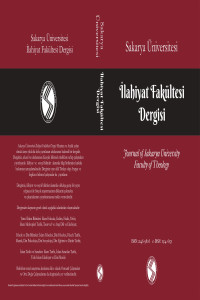Samuel Jonhson ve Mutluluğu Aramak: Habeşistan Prensi Rasselas Bir Hikâye Üzerine Bir İnceleme
Samuel Jonhson and The Search for Happiness: A Study on The Prince of Abyssinia: Rasselas a Tale
Author(s): Tamer YıldırımSubject(s): History of Philosophy
Published by: Sakarya üniversitesi
Keywords: History of Philosophy; Samuel Johnson; The Prince of Abyssinia; Happiness; Pessimism; Optimism;
Summary/Abstract: The History of Rasselas, Prince of Abissinia; Rasselas a Tale is one of the most popular of Dr. Samuel Johnson’s (1709-1784) works. Early readers of the book viewed it as a work of philosophical and practical importance and found it difficult to classify as a novel. Although Johnson wrote the book nearly 250 years ago, it continues to engage readers in discovering profound themes such as the meaning of life, death, marriage, learning, action versus inaction, and many other topics. Johnson does not address happiness based on moral theories. Johnson's emphasis on morality as the voice of God aligns with the practical spirit of his time. During his time the views of John Locke (1632-1704) and David Hume (1711-1776) had discredited metaphysics in England, as well as in the rest of Europe. Johnson's moral thought, which turned to the field of morality, is closely related to his religious attitude. According to him, metaphysics was beyond human comprehensio. However, the dogma of the Church of England, as a reasonable institution and the guardian of morality and social peace, should be accepted without question. While the origins of evil were mysterious, its consequences were evident and needed to be combatted. He believed that man's most important weapon against the evils of life was the use of reason. The subject is explained through the perspective of the moral agent the human being and, the life and conditions they experience. He tells us that “the basis for happiness is the agent and his conditions.” Happiness is found in seeking and achieving rather than in what is achieved. The Prince of Abyssinia is similar in plan and structure to Candide, which was written by Voltaire to refute the system of optimism. However, their conclusions differ significantly. The work explores almost every element that people think of finding happiness and states that they cannot give what they want. It provides examplese of individual from all walks of life, from managers to servants, from the elderly to the young, from the wise to the ignorant. All events started with the hope of happiness but ended in disappointment. Dr. Johnson, as a productive writer, has created his literary work, which is dominated by intellectual and philosophical conversations, in a way that will progress quite quickly with action and various characters. It is especially the case that subjects that have an important place in moral philosophy are told in a literary way. However, the approach to the subject in differs from the at in literature. There is a desire to appeal to a different audience by looking at the subject in a different way. Literature is suitable for daily life. In contrast those who emphasize intellectual and intellectual abilities turns to philosophy to interpret the subject.
Journal: Sakarya Üniversitesi İlahiyat Fakültesi Dergisi (SAUIFD)
- Issue Year: 26/2024
- Issue No: 50
- Page Range: 573-590
- Page Count: 18
- Language: Turkish

